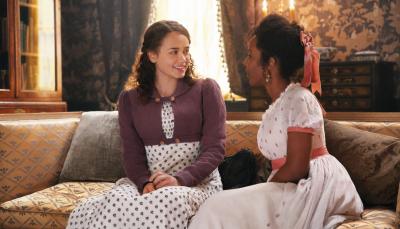Know Your 'Victoria' History: “A Coburg Quartet”

MASTERPIECE Victoria, Season 3 Episode Six Sunday, February 17, 2019; 9-10pm ET A Georgian ball at the Palace could not come at a worse time as private pictures of the Royal family are made public. Picture Shows: Prince Albert played by Tom Hughes and Queen Victoria played by Jenna Coleman For editorial use only. Courtesy of Justin Slee/ITV Plc for MASTERPIECE
©Justin_Slee 2018
Think you know the history of Queen Victoria's reign? Wondering how much of the history portrayed by PBS series Victoria is accurate?
We take a look at the truth behind the drama in the sixth episode of Season 3, "A Coburg Quartet."
Were Victoria and Albert's Marital Woes Because Of Too Many Pregnancies?
Victoria and Albert had a stormy relationship from the get-go. The series has made delightful hay of it over its first three seasons. And I doubt that anyone would argue that Victoria's many rapid-succession-of-pregnancies over the course of her marriage to Albert made their relationship any easier. However, there were multiple issues going on between them. Consider, for instance, that Victoria was a woman raised from near birth to be queen and treated with deference by all around her. When Albert pushed back, she would throw giant temper tantrums, mainly because she was Queen, and she could.
Meanwhile, the madness of her relatives, especially King George III weighed heavily on everyone's mind, including Albert's, while Victoria resented how much of the slack her husband enjoyed picking up during her maternity periods. It threatened her in many ways, not surprising for a female monarch surrounded by a patriarchal society. Also, and the show does try to portray this, Victoria hated being pregnant, suffered from what we would now call post-partum depression, and had the maternal instincts of a monarch -- that is to say, very few. Perhaps her life and marriage would have been far more comfortable if she used birth control.
Did Phrenology Suggest Edward VII Was Unfit For The Crown?
Phrenology is one of those *very* Victorian faux sciences of the era, so it's not surprising the series brought it up this week. Invented in Germany in the 1700s by Franz Joseph Gall, by the mid-1800s, most took it for granted the "science" behind phrenology was true, even if French physician Pierre Flourens had figured out by the 1840s that it was actually nonsense. Victoria's response that this is "mumbo jumbo" is utterly out of character for the era. Like Albert, she would have put stock in this diagnosis, and it would have been part of why she thought Edward unsuitable for the throne.
We should be clear here: There is no historical proof anyone tested Bertie in this manner, but that's not important. What matters here is that it leads to the diagnosis he is unfit for the throne. The part the show gets wrong is Victoria declaring it nonsense and defending her son. In reality, both Albert and Victoria thought their son would make a weak king. Moreover, Albert's last row with his oldest boy came just before his death, and Victoria blamed her son both for the fight and for his father's passing.
Did Feodora Resent Or Ever Plot Against Victoria?
I discussed this in our season premiere Victoria History post, but the answer is a resounding no. None of this Feodora storyline is historically accurate. Not even close. Let's start with the fact Feodora never visited Victoria during this era, even though the two of them were quite close and deeply committed pen pals across countries. Why? Feodora was busy giving birth to six babies of her own in Germany. Eventually, her husband (Ernst I, Prince of Hohenlohe-Langenburg) died in 1860, just a year before Albert passed. In truth, Feodora's extended stay with her sister came after Albert's passing, the two of them hanging out as grieving widows, a full decade after this season is set.
Now, some of the details are correct. Feodora married Ernst after seeing him all of twice, and as soon as she did she was shipped off to Germany. Ernst wasn't the prince of much, the lands he supposedly oversaw had been taken over by Württemberg in the restructuring known as the German mediatisation in 1806. The two lived in genteel poverty in a large and drafty castle called Schloss Langenburg. It's not entirely far-fetched that, had Feodora been a different person, she might have resented her fate versus that of her sister's. However, in this case, it's all completely untrue.




